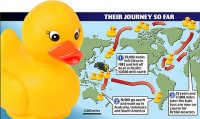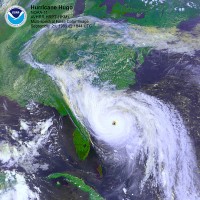By Dr. Vincent Gray, New Zealand Climate and Enviro Truth Newsletter NO. 154
Environmental fanatics who had confidently predicted the coming ice age in the 1970s changed tack in the 1980s when the climate took the upward path of its regular 65-70 year oscillation, and revived the greenhouse gas warming theory which had failed so miserably in 1896 when Svante Arrhenius first predicted it. He was just on the wrong part of the cycle, as the temperature fell for the following fifteen years, and the two world wars took the attention away from those inclined to doomsday predictions.
The problem with the greenhouse theory, which confidently predicts a steady global temperature increase as a result of increases in the concentration of greenhouse gases in the atmosphere, is that this prediction is incapable of confirmation, because it is just not practically possible to obtain a reliable average temperature of the earth’s surface. Read more here.
By Ben Clerkin, UK Daily Mail
They were toys destined only to bob up and down in nothing bigger than a child’s bath - but so far they have floated halfway around the world. The armada of 29,000 plastic yellow ducks, blue turtles and green frogs broke free from a cargo ship 15 years ago. Since then they have travelled 17,000 miles, floating over the site where the Titanic sank, landing in Hawaii and even spending years frozen in an Arctic ice pack. And now they are heading straight for Britain. At some point this summer they are expected to be spotted on beaches in South-West England.

While the ducks are undoubtedly a loss to the bath-time fun of thousands of children, their adventures at sea have proved an innvaluable aid to science. See how in this story here.
Icecap Note: This confirms the penetration of Pacific water into the arctic especially during El Nino events as has been observed by Trenberth (1999) and Shimada of JAMSTEC (2005) and the link to the Atlantic as shown by Dmitrenko et al (2003). See this Icecap story.
By Dr. Roy Spencer, University of Alabama at Huntsville
The widely accepted (albeit unproven) theory that manmade global warming will accelerate itself by creating more heat-trapping clouds is challenged this month in new research from The University of Alabama in Huntsville.
Instead of creating more clouds, individual tropical warming cycles that served as proxies for global warming saw a decrease in the coverage of heat-trapping cirrus clouds, says Dr. Roy Spencer, a principal research scientist in UAHuntsville’s Earth System Science Center. That was not what he expected to find.
“All leading climate models forecast that as the atmosphere warms there should be an increase in high altitude cirrus clouds, which would amplify any warming caused by manmade greenhouse gases,” he said. “That amplification is a positive feedback. What we found in month-to-month fluctuations of the tropical climate system was a strongly negative feedback. As the tropical atmosphere warms, cirrus clouds decrease. That allows more infrared heat to escape from the atmosphere to outer space.”
See the full report on this important new peer-review paper in the American Geophysical Union’s “Geophysical Research Letters” on-line edition here.
Scientific Alliance
Newsweek has used climate change as its cover story this week, under the title “The truth about denial”. The gist of the argument is that there is a well-funded “denial industry” which seeks to undermine the sound scientific basis for the prevailing concerns about human-induced climate change. Parallels are drawn with the tobacco industry lobby and, of course, all this is said to be taking place in the name of private profit.
This is the latest example of a deeply disturbing trend towards intolerance of dissenters, which has even led to some commentators suggesting Nuremberg-style trials of “climate criminals”. Such a febrile atmosphere is not conducive to rational thinking or discussion, so let’s take a deep breath, count to ten, and look at some of the facts.
The Scientific Alliance does not think that the prevailing IPCC view on the role of greenhouse gases is necessarily wrong. However, the evidence for it is circumstantial, there are a number of pieces of conflicting evidence, and alternative hypotheses have not all been properly evaluated. In the meantime, a complex, costly (and, at present, fairly ineffectual) set of policies for reduction of carbon intensity has been introduced. There is a danger that many countries are going further down what may prove to be a major policy cul-de-sac.
In these circumstances, people who have legitimate concerns to raise have an obligation to speak out. Constructive questioning of hypotheses serves to strengthen ones which are right and cause wrong ones to fail. How can scientists possibly object to that? See full newsletter here.
By Philip Klotzbach and William M. Gray
We have lowered our seasonal forecast slightly; however, we continue to call for a very active Atlantic basin hurricane season in 2007. We expect 13 named storms, 8 hurricanes and 4 intense hurricanes (CAT 3-5). Landfall probabilities for the United States coastline remain above their long-period averages - Entire U.S. coastline - 68% (average for last century is 52%), U.S. East Coast Including Peninsula Florida - 43% (average for last century is 31%) and the Gulf Coast from the Florida Panhandle westward to Brownsville - 44% (average for last century is 30%). Read full detailed analysis here.

By Dr. Anthony Lupo, University of Missouri
Recently, there has been a lot written about changes in hurricane frequency and how these changes may be an indicator of climate change. Yet another study has been released indicating that human activity may be partly responsible for the rise in hurricane activity over the course of the 20th century. The latest is a study entitled, ”Heightened Tropical Cyclone Activity in the North Atlantic: Natural Variability or Climate Trend?”, and published in the Philosophical Transactions of the Royal Society of London.
However, there are a few problems with the conclusions of the authors. The first and most important is that observation practices have changed radically since the 1900 – 1930 period. Today we have satellites watching over the oceans for hurricane formation. Satellite records have also allowed us to go back and “pick-up” storms that may have been missed previously and add them to the record. Naturally, there should be more tropical storms in the last few years than in the period before 1930. Also, in the most recent decades, the National Hurricane Center has named hurricanes and tropical storms, but also what they call “subtropical storms”. These storms are hybrids which have many characteristics of both tropical storms and non-tropical storms.
The problem described is akin to the change in tornado frequencies since 1900. During the 1920’s, the US averaged roughly 100 tornadoes per year, while during the last few decades, the mean has been closer to 1200. No one would argue that this 10-fold increase in tornado counts is due, even in part, to climate change.
Read full story here.
By CO2 Science
In the 24 March 2006 issue of Science, a number of commentaries heralded accelerating discharges of glacial ice from Greenland and Antarctica, while dispensing dire warnings of an imminent large, rapid and accelerating sea-level rise (Bindschadler, 2006; Joughin, 2006; Kerr, 2006; Kennedy and Hanson, 2006). This distressing news was based largely on three reports published in the same issue (Ekstrom et al., 2006; Otto-Bliesner et al., 2006; Overpeck et al., 2006), wherein the unnerving phenomena were attributed to anthropogenic-induced global warming, which is widely claimed to be due primarily to increases in the air’s CO2 content that are believed to be driven by the burning of ever increasing quantities of fossil fuels such as coal, gas and oil. But does all of this make any sense?
Hanna and Cappelen (2003) determined the air temperature history of coastal southern Greenland from 1958-2001, based on data from eight Danish Meteorological Institute stations in coastal and near-coastal southern Greenland, as well as the concomitant sea surface temperature (SST) history of the Labrador Sea off southwest Greenland, based on three previously published and subsequently extended SST data sets (Parker et al., 1995; Rayner et al., 1996; Kalnay et al., 1996). Their analyses revealed that the coastal temperature data showed a cooling of 1.29°C over the period of study, while two of the three SST databases also depicted cooling: by 0.44°C in one case and by 0.80°C in the other. In addition, it was determined that the cooling was “significantly inversely correlated with an increased phase of the North Atlantic Oscillation over the past few decades.”
Read full detailed analysis here.
By Roger Pielke Sr. Climate Science Blog
In a posting on July 26, Roger commented on the backtracking of Kevin Trenberth in a second posting on the Nature weblog.
Kevin Trenberth has followed up his weblog on the Nature site Climate Feedback - The Climate Change Blog entitled “Predictions of climate” with a weblog on the subject of climate prediction. This new posting is entitled ”Global Warming and Forecasts of Climate Change.”
Unfortunately, this new post lacks the candor that is in the original Nature weblog by Kevin Trenberth on this subject (as discussed on Climate Science here).
It should be clear in his new Nature weblog that, unfortunately, his candid comments in this earlier weblog resulted in negative feedback from his colleagues such that he felt compelled to follow up with a poor summary of climate forecasting. This is unfortunate, as his original weblog was a bridge that can be used to advance climate science.




